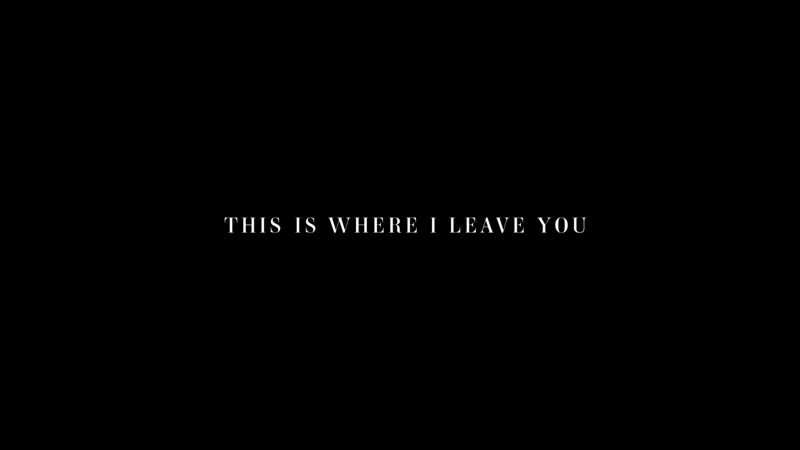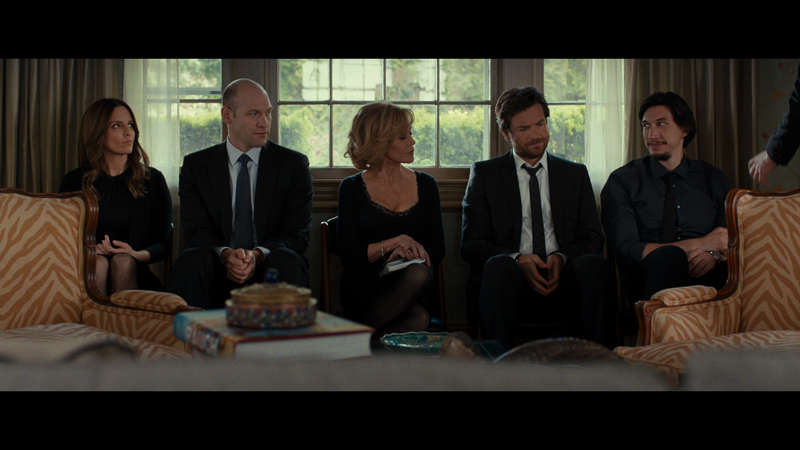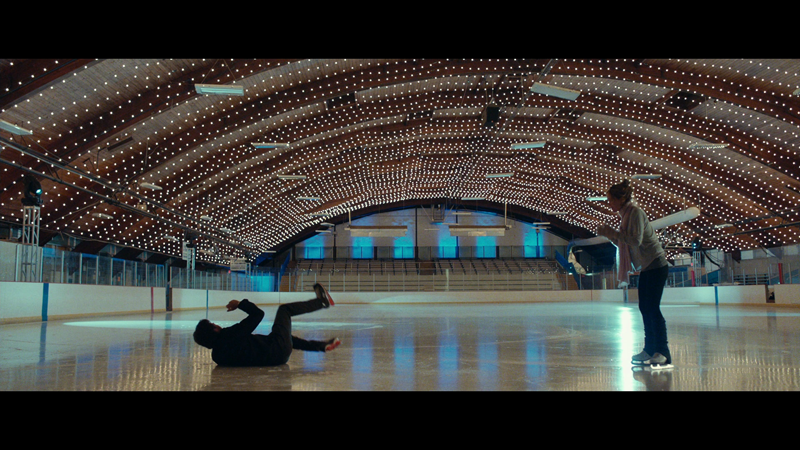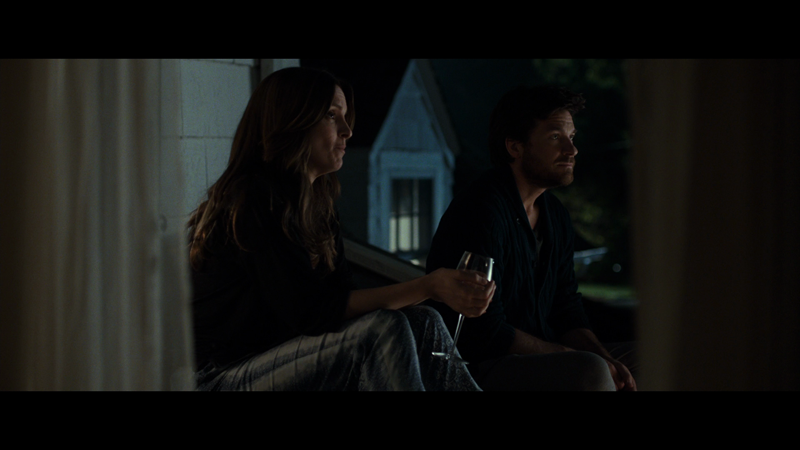| Reviews & Columns |
|
Reviews DVD TV on DVD Blu-ray 4K UHD International DVDs In Theaters Reviews by Studio Video Games Features Collector Series DVDs Easter Egg Database Interviews DVD Talk Radio Feature Articles Columns Anime Talk DVD Savant Horror DVDs The M.O.D. Squad Art House HD Talk Silent DVD
|
DVD Talk Forum |
|
|
| Resources |
|
DVD Price Search Customer Service #'s RCE Info Links |
|
Columns
|
|
|
This is Where I Leave You
Incredible cast in a credible tale of family strife

Loves: Tina Fey, Jason Bateman
Likes: Kathryn Hahn, Adam Driver
Dislikes: Mainstream comedies
Hates: White-people problems
The Movie
Outside of his family, you're not likely to find anyone who would name Shawn Levy as their favorite director. That's not a reflection on his ability as a filmmaker, but rather his preferred genre, as he makes very broad, middle-of-the-road films, like the Night at the Museum franchise or the Steve Martin version of The Pink Panther, which are engineered to appeal to the widest audience possible, while lacking in the personal style or perspective that's associated with directors of note. Of course, that means Levy's films tend to make bank at the box office, allowing him to work regularly, releasing a big movie almost once a year since 2009.
That kind of clout also has allowed him to do something of his own interest, which is adapt a favorite book: 2009's This is Where I Leave You. Working off a script by the novelist, Jonathan Tropper (also a creator on the Cinemax series Banshee), Levy used his box-office success to help gather together a truly impressive cast in order to tell the tale of the Altmans, a troubled clan of Northeasterners gathered together on the occasion of the patriarch's dead, in order to sit shiva, a final request by the remotely Jewish, but mostly atheist head of the family. So the kids, with their families or otherwise in tow, return home to mom Hillary (Jane Fonda) and fulfill their father's dying wish. Suffice it to say, things don't go smoothly.

The key to everything is Judd, the most level-headed of the group, and played just about perfectly by Jason Bateman, continuing an adult career any child star would be jealous of. Judd just went through personal hell, and coming home to deal with his family and the death of his dad is just piling on at this point. Judd serves as the audience's window into the Altmans' world, which includes Wendy (Tina Fey), a mom of two with a work-focused husband; Paul (House of Cards's Corey Stoll), who took over the family sporting-goods business but has been unable to conceive his own heir with his frustrated wife (Kathryn Hahn); and Phillip (Adam Driver), the ne'erdowell youngest child, coming home with an older woman (Connie Britton), who shares remarkable similarities with his mother.
Bateman obviously plays the hero, as we see the others through their relationships with Judd, and get a peek into his past as well, in the form of Penny (Rose Byrne), a former friend from back home, who, like Judd, moved away, but was drawn back. Together, Bateman and Byrne play one of the most adorable and likeable couples in recent film history, but manage to feel completely real as well, aided by the troubles that follow Judd back to his hometown. Levy deserves credit for making everything look and sound the way a movie like this should, with the heartfelt family moments and fun dialogue only siblings can zing each other with, even if everything feels a little too polished, like something from the Garry Marshall school of megacast dramedies. Though the movie does thankfully avoid a pat, easy ending, there's an artificiality to much of the proceedings, the kind that makes characters feel more like actors (if that makes any sense) which draws away from the film's better moments (which feature some very poignant thoughts and scenes, particularly with Byrne, Bateman, Fey and Tim Olyphant, who has a small, but interesting role in a subplot that's not overplayed by the movie.)
If Levy did anything just right though, it was in casting Fonda as the mom, who plays that role in a wonderfully touching manner, while also being extremely funny (and looking quite good doing it), Hahn as Paul's wife (delivering pure range in what could have been a forgettable part) and putting in Ben Schwartz as the rabbi (and a childhood acquaintance of the Altman kids.) Schwartz is an incredible scene stealer, as anyone who has watched him in basically anything he's done, and this movie is no exception, as he is hysterical in every scene he appears in, trying to act as holy as possible, despite being dragged back to adolescence by his former school friends.

The Discs
This is Where I Leave You arrives on one Blu-ray and one DVD, packed into a standard Blu-ray keepcase, which itself is inside a slipcover that repeats the cover art. The usual terrible Warner Brothers menu offers a choice (aided by clip-art-esque icons) to watch the film, select scenes, adjust the set-up and check out the special features. Audio options include English 5.1 DTS-HD Master Audio and French, Spanish and Portuguese 5.1 Dolby Digital tracks, while subtitles are available in English SDH, French, Spanish and Portuguese (note, the Portuguese track and subtitles are not listed on the box.)
The Quality
The 1080p, 2.40:1, AVC-encoded transfer here is not going to blow most people away, simply because the look was never intended to be high-gloss and super sharp. This is a movie that lives in soft light and the visuals experience the downside of such a style, particularly the darker scenes, which are noticeably noisy. On the other hand, colors are appropriate, if slightly muted, the level of fine detail is good and black levels are sufficiently deep. There are no issues with digital distractions.
The 5.1 DTS-HD Master Audio track does the trick for this film, keeping the dialogue clear and well-separated from the rest of the audio elements, for the most part delivered front and center. The surrounds get a bit of work from some atmospheric effects and the film's great soundtrack selections and strong score, but you're not going to get any kind of real directionality or movement in the mix. It's just not that kind of movie. What is here though is strong and free of any noticeable distortion.
The Extras
The big extra here is an audio commentary with Levy and Tropper, where the duo discuss comparisons between the book and the movie and the improvisation that was done on the set, while heaping loads of praise onto their collaborators. They may love the film a bit too much, as there are several points where they stop talking and just watch, leaving too much dead air, but they also have a good deal of production details to share from their time on the set.
The pairing is also the focus of "The Narrative Voice," a 4:28 featurette which, like the commentary, looks at how the book was adapted into a film, as well as how the writing was tailored to the actors, once the roles were cast.
There's a set of four other featurettes under the banner "Points of Departure," though what makes them different from the "Narrative Voice" piece is unclear. First up is "The Brother-Sister Bond" (5:38), centering on the relationship between Judd and Wendy, with on-set footage and interviews with Bateman, Fey, Fonda, Hahn and Levy. Then there's "The Matriarch" (3:59) with Levy, Fonda, Olyphant, Driver and Hahn talking about the part of the mom and what Fonda brought to the role. "Sibling Rivals" (5:04) expands the focus to the pairing of Paul and Phillip, with more interviews that discuss what was unique about those two, and the actors who portrayed them. Finally, the 5:38 "Choreographed Chaos" is about Levy's role as the ringmaster, as explained in interviews with the key members of the cast. In these bits, the praise threatens to drown all it rises so high.
Six deleted scenes are included as well, running 13:34, but nothing here was all that memorable, with the exception of an additional moment between Judd and Paul's wife, which pushes the uncomfortable connection between them a bit further, and gives a glimpse of Hanh's backside, for those looking for such things.
Smartly, before closing things up, Schwartz gets some spotlight in "The Gospel According to Rabbi Boner" (6:27), which talks about the role and the performance, including the origin and motivation for the character, via interviews with Levy and Tropper, as well as Schwartz, Fey and Hahn, all of whom and blended around alternate takes from the cutting room floor.
Also in the package is a code for an Ultraviolet stream/download.

The Bottom Line
This is Where I Leave You could be a film that grows an audience as time goes by, as viewers find it thanks to the cast, and stick around for the inoffensive, unchallenging story, which has enough good stuff happening to carry it through its 100 minutes. In that way, it shares a lot of DNA with Levy's other works. The presentation here is solid, fitting the movie, while the bonus content is decent, but focused a bit more on self-congratulations than anything else. Like Levy himself, this isn't likely to be anyone's favorite, but that won't stop it from entertaining plenty of viewers.
Francis Rizzo III is a native Long Islander, where he works in academia. In his spare time, he enjoys watching hockey, writing and spending time with his wife, daughter and puppy.Follow him on Twitter
*The Reviewer's Bias section is an attempt to help readers use the review to its best effect. By knowing where the reviewer's biases lie on the film's subject matter, one can read the review with the right mindset.
|
| Popular Reviews |
| Sponsored Links |
|
|
| Sponsored Links |
|
|
| Release List | Reviews | Shop | Newsletter | Forum | DVD Giveaways | Blu-Ray | Advertise |
|
Copyright 2024 DVDTalk.com All Rights Reserved. Legal Info, Privacy Policy, Terms of Use,
Manage Preferences,
Your Privacy Choices | |||||||













